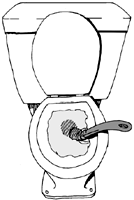![[Metroactive Features]](/features/gifs/feat468.gif)
[ Features Index | San Jose | Metroactive Central | Archives ]
 Illustration by Jeremy Russell Reality Check By Annalee Newitz LAST WEEKEND I finally had a chance to chat with a writer whose work started inspiring me way back in the early 1990s. At that time I was a graduate student and came across a fantastically smart and well-written book called Fear of Falling: The Inner Life of the Middle Class (1987). Written by Barbara Ehrenreich, it was a careful dissection of a group of people whose economic position gives them an inordinately large influence over nearly every aspect of American culture. What struck me about the book was Ehrenreich's ability to portray not just the sociopolitics of my own situation, but how it felt. At one point in Fear of Falling, she describes how the professional middle class creates its "own, internalized lower-class," i.e., interns, graduate students, entry-level workers and the like: protoprofessionals who train to be doctors, lawyers, professors and journalists by doing menial grunt work. Here, I thought, was a brave writer who could look her own life in the face and come back with a measured and steady critique. I've followed Ehrenreich's career closely since then, reading her surly columns in Time and gobbling up her extended essay on why we go to war, Blood Rites (1997). But nothing pleased me more than her new book, Nickel and Dimed: On (Not) Getting by in America (Metropolitan Books). Like Fear of Falling, it's an unflinching look at class, this time from the perspective of the working poor. Ehrenreich, a longtime supporter of welfare, conducted an experiment to see if Clinton's "welfare reform" would indeed help people to get jobs that would support them. It was a simple matter of crunching numbers, really--Ehrenreich could have figured out the average price of rents, groceries and other life needs, and determined whether they could be covered by someone working a minimum wage job. But Ehrenreich didn't just add up the numbers; she put her money where her mouth was and lived them. In a series of month-long forays into low-wage living, Ehrenreich worked as a waitress, a maid and a Wal-Mart retail bunny. What emerges is a portrait of the working class that's powerful precisely because it goes beyond the numbers and into personal experience. It's one thing to hear that maid work is difficult and low paid, but it's quite another to read about how it feels to kneel over for hours scrubbing wealthy people's bathrooms--all for a salary that isn't adequate to cover a tiny apartment. When I called Ehrenreich to talk about Nickel and Dimed, she was washing socks. "Oh, excuse me," she said politely, "I'm doing my hand washing right now because it's the only time I'm not on the road promoting the book." After a brief discussion about the shamefulness of welfare reform policies--which don't provide workers with anything resembling a living wage--Ehrenreich's sock washing brought us around to talking about maid work. In Nickel and Dimed, Ehrenreich writes that she would never hire a maid because she "doesn't want to have that kind of relationship with someone else." When I confessed that I have maids do housework where I live, she sighed and said, "Well, maid work is where class inequalities are really in your face--the contrasts between the maids' lives and the people whose houses they work in are so painful." Although many so-called feminist professionals have been liberated from having to do housework, often that's because they can afford to hire (nonliberated) working class women to do housework for them. Ehrenreich, a staunch feminist, explained that feminist freedoms come with a price tag and that feminism has also created its own internalized lower class. Perhaps the most interesting part of Ehrenreich's experiences in Nickel and Dimed --at least for the newly impoverished dotcom set--is that she had such a hard time making ends meet during the height of the economic boom in the late '90s and early '00s. "The problems I was writing about aren't features of the business cycle," she said. "There are really two economies in this country. One goes up and down and makes people rich or not. The other is a permanent depression [that] goes on constantly. The depression economy isn't even counted as a 'real' economy. "For a lot of the dotcom yuppies now taking the plunge, well, all I can say is welcome to the other economy."
Annalee Newitz (wageslave@techsploitation.com) is a surly media nerd who believes everyone has the right to live like a member of the professional middle class if they want to. Barbara Ehrenreich will be doing readings in San Francisco on May 30 (Commonwealth Club) and May 31 (Book Passage). [ San Jose | Metroactive Central | Archives ]
|
From the May 31-June 6, 2001 issue of Metro, Silicon Valley's Weekly Newspaper.
Copyright © 2001 Metro Publishing Inc. Metroactive is affiliated with the Boulevards Network.
For more information about the San Jose/Silicon Valley area, visit sanjose.com.